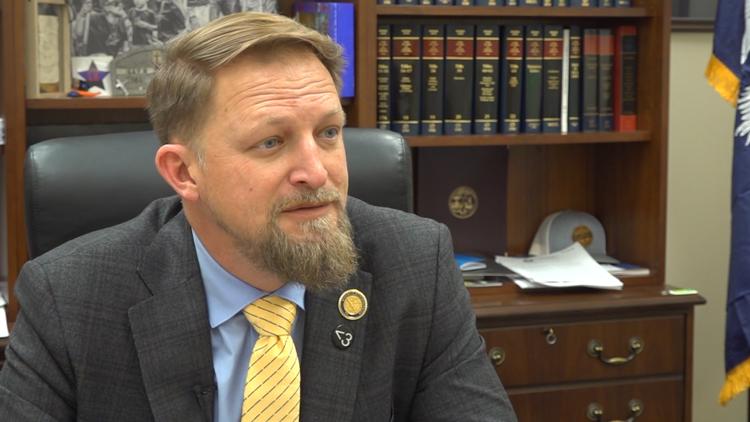

President Trump signs the Take It Down Act, targeting online sextortion, at a White House ceremony attended by Rep. Brandon Guffey.
YORK COUNTY, S.C. — A South Carolina lawmaker whose teenage son died by suicide after being targeted in an online sextortion scheme attended the White House signing ceremony Monday for legislation aimed at combating such exploitation.
President Donald Trump signed the Take It Down Act, which makes it a federal crime to knowingly publish or threaten to publish intimate images without consent and requires online platforms to remove such content within 48 hours of a victim’s request.
“It’s overwhelming for me as a representative to think, you know, 2.5 years ago, whenever I kind of made this my passion to be sitting at the White House,” Rep. Brandon Guffey (R-York) told WCNC Charlotte’s Vanessa Ruffes following the ceremony. Guffey appeared on Live Impact Evening News on WCNC+ to discuss the bill and further actions he hopes to see.
The bill received strong bipartisan support, passing the Senate 99-1 and the House 409-2.
Guffey’s advocacy stems from personal tragedy. His son, Gavin Guffey, took his own life after falling victim to online extortion from Nigeria. A suspect has been extradited and faces a pretrial hearing later this month for charges of child exploitation resulting in death, cyberstalking resulting in death and interstate threats with intent to extort.
“I will fight until the day that I die to make sure that another child does not feel that way, that that is the only option,” Guffey said.
While celebrating the law as progress, Guffey said it’s just a first step. He criticized tech companies for prioritizing profits over child safety and called for additional measures, including repealing Section 230, which provides liability protection for online platforms.
“Big tech is the equivalent of big tobacco of this generation,” Guffey said, noting that Meta once removed 63,000 extortion accounts in a single day from Nigeria but has done little since.
Guffey is also advocating for an App Store Accountability Act to give parents more control over age-appropriate content available to children.
Free speech advocates have criticized the Take It Down Act as potentially too broad, saying it could lead to censorship of legitimate content or undermine due process.
“It baffles me at the amount of people that can sit here and argue to remove a book from a library because they claim parental rights, but whenever we start talking about protecting kids online, they want to start screaming First Amendment,” Guffey said.


